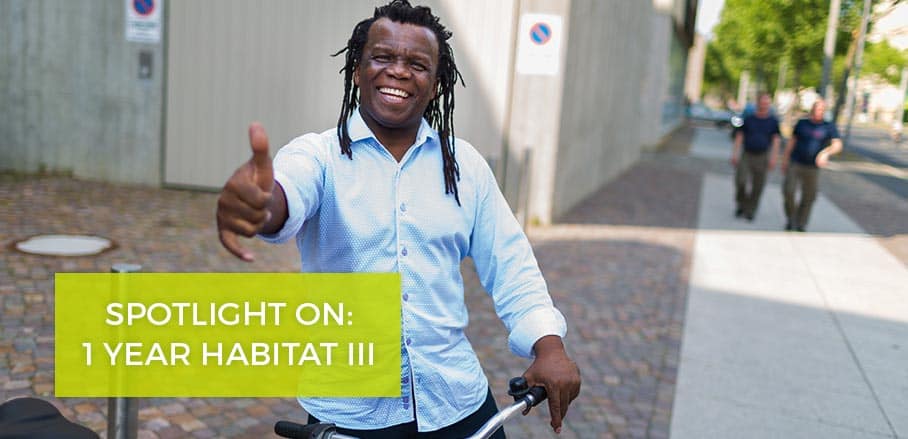Paving the way for sustainable urban mobility: TUMI celebrates one-year anniversary
By Armin Wagner
From Cairo to Brasilia to Kaohsiung: the TUMI initiative offers exciting opportunities for international collaboration and learning on sustainable urban mobility. Launched at Habitat III last year, TUMI now celebrates its one-year anniversary. For URBANET, Armin Wagner takes stock of what has been achieved so far.
Cities in developing countries and emerging economies are growing by the hour. Developments in transport systems, however, are not keeping pace. [inlinetweet prefix=”” tweeter=”URBANET” suffix=””]One in three people live in informal settlements with minimal access to transport services[/inlinetweet], making it difficult to reach work places, schools or other social and economic facilities. Meanwhile, growing transport volumes from rapid urban growth increasingly contribute to climate change. Without a global shift in mobility patterns, the targets of the Paris Climate Agreement and the Agenda 2030 cannot be reached.
Urban areas are engines of economic and social development. They are centres of knowledge, capital, and power, and hold the promise of better living conditions, prosperity and opportunity. However, as new cars hit the streets every month, commuters in cities around the world find themselves stuck in traffic in the morning, hoping to reach work on time. Walking is sometimes the only alternative, but safe walkways are often non-existent. This leaves people with fewer opportunities to find adequate jobs, companies with limited access to work force and production inputs, and markets that can only be supplied at very high costs.
Dysfunctional urban transport systems paralyze cities in their ability to provide better living conditions for citizens. Cities are key to sustainable development – to raise to their full potential, to solve global challenges and to provide better living conditions for citizens, they must tackle issues of urban mobility.
Transport – particularly urban transport – is a key target in the Sustainable Development Goals (SDGs) of the 2030 Agenda for Sustainable Development and in the majority of the so-called Intended Nationally Determined Contributions (INDCs). Seven out of the 17 SDGs contain explicit transport-related targets or require ambitious action in the transport sector. 77 per cent of all committed INDCs identify transport as a source of emissions, 86 per cent of which focus on urban mobility.
Climate change demands our united action: the historic climate summit in Paris, the agreement of the 2030 Agenda for Sustainable Development, and the New Urban Agenda all give a strong directive to work with partners in meeting the ambitious climate and sustainable development targets.
TUMI supports cities on their path towards sustainable mobility[inlinetweet prefix=”” tweeter=”URBANET” suffix=””]Today, on October 17th, the Transformative Urban Mobility Initiative (TUMI) celebrates its 1st birthday[/inlinetweet]. Launched at HABITAT III by the German Federal Ministry of Economic Cooperation and Development (BMZ), it is one of the central implementation commitments for the New Urban Agenda (NUA) and part of the Quito Implementation Plan (QIP). TUMI paves the way for global shifts in transportation and mobility by supporting transport system management and urban mobility efficiency in African, Asian and Latin American cities, and hence aims at putting into practice the global mobility transition.
TUMI’s approach to sustainable mobility is based on three pillars that are closely linked to and support each other. Through Capacity Development, TUMI supports political leaders and change-makers with tailor-made capacity-building formats. The Investment pillar develops concepts for project financing which target replicable, innovative approaches and reliable technologies. Complementing these components, Innovative Solutions encourage cities and stakeholder groups to develop ambitious project ideas and pilot activities across the globe.
TUMI activities
Since TUMI was launched at HABITAT III in Quito in October 2016, a lot has happened in support of the New Urban Agenda:
- In May 2017, more than 80 transport practitioners engaged in the TUMI Conference on Urban Mobility Governance at the side of the International Transport Summit 2017 in Leipzig. During the conference, urban planners and creative minds from Sub-Saharan Africa came together. Together, they explored municipal transport governance, discussed and debated challenges and solutions, and showcased findings from latest research.
- During the 4th Meeting of the Municipalities for Sustainable Development (EMDS) in April 2017 in Brasília, TUMI offered a series of courses. City managers and secretaries, researchers, students and representatives of civil society organisations learned about urban issues and discussed main challenges and potential solutions in Brazilian municipalities.
- TUMI held courses on all continents, engaging participants every step of the way. These included the planning of public bicycle rental systems in Quito, integrated urban transport systems in Cairo, a study tour of the Bus Rapid Transit (BRT) in Dar es Salaam, urban road safety in Mexico City and many others. In total, more than 120 people listened in on three webinars and e-Learning courses, and about 490 people were trained in workshops and conferences.
Looking ahead towards more ambitious mobility projects
As TUMI celebrates its first anniversary, many more ambitious mobility projects are in preparation worldwide. Be it Addis Ababa, Dar es Salam and Cape Town in Sub-Saharan Africa, be it Kaohsiung/Taiwan or New York City, innovative cities are showing the potential for urban transformation through rapid bus transit, light rail systems and non-motorised transport infrastructure. In order to succeed, mobility projects need to be well framed and coherent with local policies and citizen needs. They must include the right stakeholders and technical and political capacity so transport built up will be ensured. Thus, the need for strong political leadership and institutions are key to sustainable infrastructure solutions.
With a promising start, TUMI will continue to face the challenges of sustainable development in 2018 and contribute to finding holistic solutions for municipalities with different requirements and needs.
